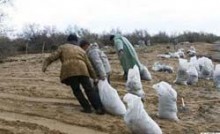SIMFEROPOL — The Crimean government is concerned about the 55,000 tons of fuel oil mixed with sand and algae in the seaport of Kerch, which were collected following the shipwreck of Russian tankers in the Strait of Kerch on Nov. 11, 2007. Eduard Hryvkovsky, the deputy head of the Council of Ministers of the Autonomous Republic of the Crimea, raised this issue with the head of the Council of Ministers at a recent government meeting. He said that “55,000 tons of oil remain in Kerch, and there is still no coordinated resolution on further actions. Despites its promises to bring the oil to its territory, Russia has so far refused to honor them, and we have nowhere to utilize this mass of oil.” With air temperatures rising to 20 degrees, the thousands of tons of oil are starting to liquate and spread throughout the port. When the oil enters the water, marine life — fish and birds — will be at risk again.
Previous issues of The Day (nos. 210 and 211 of Dec. 1 and 4, 2007) featured materials from the roundtable “How Should Ukraine Resist the ‘Storm’?” during which the Kerch disaster was discussed at our editorial office. The Day’s experts made recommendations on reconstructing the country’s ecological system. However, neither the transport nor the environmental protection ministry has followed up on them. Thus, Ukraine is facing new problems.
“We are insisting that the problem be considered on the inter-state level and resolved in a friendly way, but we, the residents of the Crimea, can do little about this. The only thing is that we cannot wait for the weather to get warmer because this will put the Crimean territories and bodies of water at risk,” said Viktor Plakyda, the head of the Crimea’s Council of Ministers.
Resident of the village of Naberezhne have appealed to the Crimean mass media with a request to accelerate the work of collecting the oil from the village’s beaches, since volunteers are the only ones doing this so far, and local boarding houses are in no hurry to adopt any measures.
According to the results of earlier research, the damage to the Crimea caused by the gales and ensuing shipwreck on Nov. 11, 2007, has been assessed at nearly 120 million hryvnias. Meanwhile, Kyiv still has not revealed the total losses stemming from the water pollution in the Strait of Kerch. A special interdepartmental working group is supposed to come up with this figure, but it has not completed its work. The Ukrainian side has stated that in estimating the damage to the marine environment, both short-term consequences, like the death of birds, pollution by fuel oil and sulfur, and long-term consequences, which will become apparent in the next few years, must be considered. Among the latter are the loss of the recreational value of the coastal territories, irreversible changes to the marine ecological system, and impact on water resources. The final claims figure has not been announced.
In a live broadcast on one of the main television channels President Viktor Yushchenko said that he blames the owners of the vessels that sank in the Strait of Kerch for damaging Ukraine’s environment in the Black Sea region. The president also announced that he has tasked the Ministry of Foreign Affairs and Ministry of Transport and Communications with launching official negotiations with the Russian Federation in order to determine the total losses and their reimbursement. During the first session of the Ukrainian-Russian working group to eliminate the consequences of the disaster in the Azov-Black Sea basin, Ukraine’s Minister of Foreign Affairs Volodymyr Ohryzko, who was the first deputy head of Ukraine’s foreign ministry at the time of the disaster, declared that the Russian side should pay for the damages resulting from the pollution in the Strait of Kerch. According to the data of the Novorossiisk Transport Prosecutor’s Office, the damage caused by the oil spill reaches $898 million.







